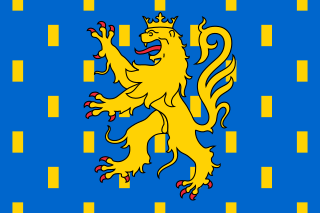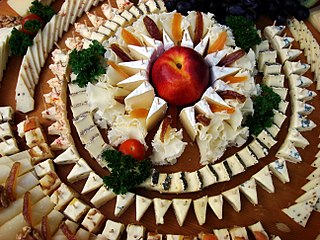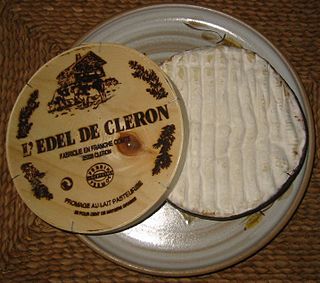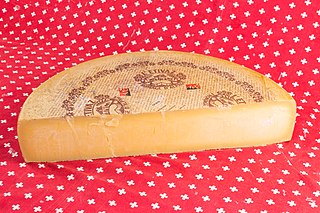Vacherin may refer to:
- Vacherin Mont d'Or, a soft cheese made in France and Switzerland
- Vacherin Fribourgeois, a semi-hard cheese made in Switzerland
Vacherin may refer to:

Swiss cheese is any variety of cheese that resembles Emmental cheese, a yellow, medium-hard cheese that originated in the area around Emmental, Switzerland. It is classified as a Swiss-type or Alpine cheese. Some types of Swiss cheese have a distinctive appearance, as the blocks or rounds of the cheese are riddled with holes known as "eyes". Swiss cheese without eyes is known as "blind".

Franche-Comté is a cultural and historical region of eastern France. It is composed of the modern departments of Doubs, Jura, Haute-Saône and the Territoire de Belfort. In 2016, its population was 1,180,397.

Gruyère is a hard Swiss cheese that originated in the cantons of Fribourg, Vaud, Neuchâtel, Jura, and Berne in Switzerland. It is named after the town of Gruyères in Fribourg. In 2001, Gruyère gained the appellation d'origine contrôlée (AOC), which became the appellation d'origine protégée (AOP) as of 2013.

The Reuben sandwich is a North American grilled sandwich composed of corned beef, Swiss cheese, sauerkraut, and Thousand Island dressing or Russian dressing, grilled between slices of rye bread. It is associated with kosher-style delicatessens, but is not kosher because it combines meat and cheese.

Kashkaval is a type of cheese made from cow's milk, sheep's milk or both. In Albania, Bulgaria, North Macedonia, Serbia and Romania, the term is often used to refer to all yellow cheeses. In English-language menus in Bulgaria, kashkaval is translated as "yellow cheese".

Fondue is a Swiss melted cheese dish served in a communal pot over a portable stove heated with a candle or spirit lamp, and eaten by dipping bread into the cheese using long-stemmed forks. It was promoted as a Swiss national dish by the Swiss Cheese Union in the 1930s, and was popularized in North America in the 1960s.

Swiss cuisine is an ensemble of national, regional and local dishes, consisting of the ingredients, recipes and cooking techniques developed in Switzerland or assimilated from other cultures, particularly neighboring countries. The diversity and comprehensiveness of Swiss gastronomy reflects the linguistic, cultural and geographical diversity. The climate of Switzerland allows for a large variety of terroirs, therefore a wide range of indigenous food, from simple cereals to refined products like cheese and wine.
Swiss may refer to:

Comté is a French cheese made from unpasteurized cow's milk in the Franche-Comté region of eastern France bordering Switzerland and sharing much of its cuisine. Comté has the highest production of all French Appellation d'origine contrôlée (AOC) cheeses, at around 66,500 tonnes annually. It is classified as a Swiss-type or Alpine cheese.

Beaufort is a firm, raw cow's milk cheese associated with the gruyère family. An Alpine cheese, it is produced in Beaufortain, Tarentaise valley and Maurienne, which are located in the Savoie region of the French Alps.

Pont-l'Évêque is a French cheese, originally manufactured in the area around the commune of Pont-l'Évêque, between Deauville and Lisieux in the Calvados département of Normandy. It is probably the oldest Norman cheese still in production.
Swiss cheese may refer to:

Vacherin Fribourgeois a Swiss semi-hard cheese made from thermised milk. It is produced under Swiss AOC in the canton of Fribourg, where Gruyère also originates. It has a slightly acidic, resiny flavor, akin to Italian Fontina, with a varying strength depending on the age and type. It is also a basic component lending character to fondues. Vacherin Fribourgeois has Swiss AOC status with 6 varieties being available:

Cheese is a dairy product produced in wide ranges of flavors, textures, and forms by coagulation of the milk protein casein. It comprises proteins and fat from milk. During production, milk is usually acidified and either the enzymes of rennet or bacterial enzymes with similar activity are added to cause the casein to coagulate. The solid curds are then separated from the liquid whey and pressed into finished cheese. Some cheeses have aromatic molds on the rind, the outer layer, or throughout.

Édel de Cléron is a traditional French cheese of relatively recent origin which carries the name of the village where it is made, Cléron, in the valley of the Loue of the Doubs department in Franche-Comté.
Mont d'Or may refer to:

Swiss-type cheeses, also known as Alpine cheeses, are a group of hard or semi-hard cheeses with a distinct character, whose origins lie in the Alps of Europe, although they are now eaten and imitated in most cheesemaking parts of the world. Their distinct character arose from the requirements of cheese made in the summer on high Alpine grasslands, and then transported with the cows down to the valleys in the winter, in the historic culture of Alpine transhumance. Traditionally the cheeses were made in large rounds or "wheels" with a hard rind, and were robust enough for both keeping and transporting.

In Switzerland, the appellation d'origine protégée is a geographical indication protecting the origin and the quality of traditional food products other than wines.